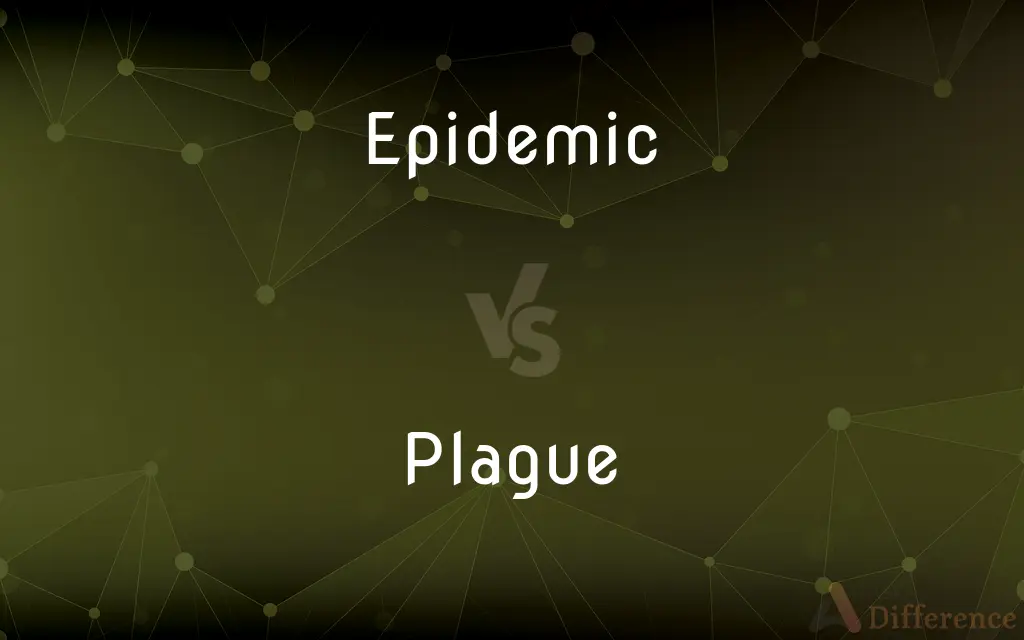Epidemic vs. Plague — What's the Difference?
By Tayyaba Rehman & Fiza Rafique — Updated on May 9, 2024
An epidemic is a disease outbreak affecting many people in a specific region, while a plague is a type of infectious disease, referring to historic pandemics like the Black Death, or any destructive disease outbreak causing significant societal impacts.

Difference Between Epidemic and Plague
Table of Contents
ADVERTISEMENT
Key Differences
An epidemic is an occurrence where a disease spreads rapidly among people in a specific area. For example, seasonal influenza often causes annual epidemics, affecting thousands of individuals within a country or region. On the other hand, a plague specifically refers to infectious diseases like the Bubonic plague, which historically caused widespread devastation across continents.
An epidemic is generally used to describe a sudden increase in cases of a particular disease. This term can apply to both well-known diseases like measles and lesser-known emerging illnesses. In contrast, a plague specifically denotes significant historical disease outbreaks, particularly ones caused by Yersinia pestis bacteria, such as the Black Death.
An epidemic, while serious, might not cause lasting societal disruption if it is controlled swiftly. Influenza epidemics, for instance, can usually be managed with vaccination and antiviral treatment. However, a plague often leads to catastrophic social and economic consequences, largely due to its rapid and severe progression and high mortality rates.
Epidemics can also be limited in geographic spread or restricted to particular demographics, such as hospital-associated outbreaks. A plague, however, has historically transcended geographic and demographic boundaries, leading to pandemics that devastated entire continents.
Comparison Chart
Definition
Widespread disease outbreak
Specific infectious disease outbreak
ADVERTISEMENT
Scope
Regional
Continental or global
Historical Usage
Used in general terms
Refers to pandemics like Black Death
Common Causes
Viral or bacterial infections
Bacteria (Yersinia pestis)
Severity
Can vary, often moderate
Usually severe and fatal
Compare with Definitions
Epidemic
A widespread occurrence of an infectious disease in a community.
The health authorities are taking measures to control the influenza epidemic.
Plague
An infectious disease caused by Yersinia pestis.
Antibiotics are now effective in treating the plague if caught early.
Epidemic
An increase in cases of a particular illness above normal levels.
There was an epidemic of cholera after the natural disaster.
Plague
A deadly infectious disease causing high mortality rates.
Medieval Europe was devastated by the Bubonic plague.
Epidemic
Any sudden, widespread phenomenon.
There is an epidemic of misinformation on social media.
Plague
A highly infectious epidemic disease, especially one with a high rate of fatality; a pestilence.
Epidemic
An epidemic (from Greek ἐπί epi "upon or above" and δῆμος demos "people") is the rapid spread of disease to a large number of people in a given population within a short period of time. For example, in meningococcal infections, an attack rate in excess of 15 cases per 100,000 people for two consecutive weeks is considered an epidemic.Epidemics of infectious disease are generally caused by several factors including a change in the ecology of the host population (e.g., increased stress or increase in the density of a vector species), a genetic change in the pathogen reservoir or the introduction of an emerging pathogen to a host population (by movement of pathogen or host).
Plague
A virulent, infectious disease that is caused by the bacterium Yersinia pestis (syn. Pasteurella pestis) and is transmitted primarily by the bite of fleas from an infected rodent, especially a rat. In humans it occurs in bubonic form, marked by lymph node enlargement, and in pneumonic form, marked by infection of the lungs, and can progress to septicemia.
Epidemic
A widespread occurrence of an infectious disease in a community at a particular time
A flu epidemic
Plague
A widespread affliction or calamity seen as divine retribution.
Epidemic
Of the nature of an epidemic
Shoplifting has reached epidemic proportions
Plague
An influx or large number of destructive or unwanted things, especially animals
“The vines flourished, the only problem being a plague of jackrabbits” (Paul Lukacs).
Epidemic
Spreading rapidly and extensively by infection and affecting many individuals in an area or a population at the same time
An epidemic outbreak of influenza.
Plague
Something that causes persistent hardship, trouble, or annoyance
“The plague of every funnyman's success is that deep down, almost everyone thinks they know forty guys funnier” (Ross Vachon).
Epidemic
Widely prevalent
Epidemic discontent.
Plague
To pester or annoy persistently or incessantly.
Epidemic
An outbreak of a contagious disease that spreads rapidly and widely.
Plague
To cause suffering or hardship for
“Runaway inflation further plagued the wage- or salary-earner” (Edwin O. Reischauer).
Epidemic
A rapid spread, growth, or development
An unemployment epidemic.
Plague
To be a widespread or continuous problem or defect in
Confusing jargon plagues the entire subject.
Epidemic
A widespread disease that affects many individuals in a population.
Plague
(often used with the, sometimes capitalized: the Plague) The bubonic plague, the pestilent disease caused by the virulent bacterium Yersinia pestis.
Epidemic
(epidemiology) An occurrence of a disease or disorder in a population at a frequency higher than that expected in a given time period; an episode of outbreak and subsequent high prevalence.
Plague
(pathology) An epidemic or pandemic caused by any pestilence, but specifically by the above disease.
Epidemic
(figurative) The spreading of an idea or belief amongst a population.
Plague
A widespread affliction, calamity or destructive influx, especially when seen as divine retribution.
Ten Biblical plagues over Egypt, ranging from locusts to the death of the crown prince, finally forced Pharaoh to let Moses's people go.
Epidemic
Like or having to do with an epidemic; widespread.
Epidemic hysteria occurred upon the incumbent’s reelection.
Plague
(figurative) A grave nuisance, whatever greatly irritates.
Bart is an utter plague; his pranks never cease.
Epidemic
Common to, or affecting at the same time, a large number in a community; - applied to a disease which, spreading widely, attacks many persons at the same time; as, an epidemic disease; an epidemic catarrh, fever, etc. See Endemic.
Plague
(ornithology) A group of common grackles.
Epidemic
Spreading widely, or generally prevailing; affecting great numbers, as an epidemic does; as, epidemic rage; an epidemic evil.
It was the epidemical sin of the nation.
Plague
(transitive) To harass, pester or annoy someone persistently or incessantly.
Epidemic
An epidemic disease.
Plague
(transitive) To afflict with a disease or other calamity.
Natural catastrophes plagued the colonists till they abandoned the pestilent marshland.
Epidemic
Anything which takes possession of the minds of people as an epidemic does of their bodies; as, an epidemic of terror.
Plague
That which smites, wounds, or troubles; a blow; a calamity; any afflictive evil or torment; a great trail or vexation.
And men blasphemed God for the plague of hail.
The different plague of each calamity.
Epidemic
A widespread outbreak of an infectious disease; many people are infected at the same time
Plague
An acute malignant contagious fever, that often prevails in Egypt, Syria, and Turkey, and has at times visited the large cities of Europe with frightful mortality; hence, any pestilence; as, the great London plague.
Epidemic
(especially of medicine) of disease or anything resembling a disease; attacking or affecting many individuals in a community or a population simultaneously;
An epidemic outbreak of influenza
Diseases endemic to the tropics
Endemic malaria
Food shortages and starvation are endemic in certain parts of the world
Plague
To infest or afflict with disease, calamity, or natural evil of any kind.
Thus were they plaguedAnd worn with famine.
Plague
Fig.: To vex; to tease; to harass.
She will plague the man that loves her most.
Plague
A serious (sometimes fatal) infection of rodents caused by Yersinia pestis and accidentally transmitted to humans by the bite of an infected rat flea (especially bubonic plague)
Plague
Any epidemic disease with a high death rate
Plague
A swarm of insects that attack plants;
A plague of grasshoppers
Plague
Any large scale calamity (especially when thought to be sent by God)
Plague
An annoyance;
Those children are a damn plague
Plague
Cause to suffer a blight;
Too much rain may blight the garden with mold
Common Curiosities
Is every epidemic a plague?
No, epidemics include various diseases that may not have the devastating impact of a plague.
What is an example of a recent epidemic?
An example is the COVID-19 pandemic, which began as a regional epidemic.
How is an epidemic controlled?
It can be controlled through quarantine, vaccination, public health measures, and treatment.
Are modern epidemics usually viral or bacterial?
They can be both, but viral diseases, like COVID-19 or influenza, are more common due to their rapid spread.
Can a plague be caused by something other than Yersinia pestis?
While "plague" often refers specifically to infections caused by Yersinia pestis, other types of destructive outbreaks can be colloquially referred to as plagues.
Why did historical plagues have such a high mortality rate?
Historically, medical knowledge was limited, and there were no antibiotics or vaccines, making it challenging to diagnose or treat plagues effectively.
What measures were historically used to control plagues?
Measures like quarantine, isolation, and rudimentary sanitation practices were used, though often with limited success due to a lack of medical understanding.
Is the plague still a threat today?
Yes, although rare, the plague still exists but is treatable with antibiotics.
Can a plague cause an epidemic?
Yes, plagues historically caused epidemic and pandemic outbreaks.
How does an epidemic differ from a pandemic?
An epidemic is confined to a specific region or population, while a pandemic spreads globally, affecting multiple countries and continents.
Are epidemics always infectious diseases?
Although primarily infectious, the term can also refer to non-infectious public health crises, like obesity or substance abuse epidemics.
Can vaccines prevent epidemics?
Yes, vaccines can be effective in preventing many infectious diseases from reaching epidemic levels.
Is there a difference between the Bubonic plague and other forms of plague?
Yes, Bubonic plague affects the lymph nodes, while other forms, such as pneumonic or septicemic plague, impact the lungs or bloodstream.
What is the significance of surveillance in managing epidemics?
Surveillance helps detect early cases, assess disease spread, and guide public health interventions to contain the epidemic.
Do plagues occur more frequently in certain climates or regions?
Plagues often arose in areas with dense populations, poor sanitation, and high rat populations, as rats were primary carriers of fleas that transmitted Yersinia pestis.
Share Your Discovery

Previous Comparison
Concept vs. Approach
Next Comparison
Infraclass vs. ClassAuthor Spotlight
Written by
Tayyaba RehmanTayyaba Rehman is a distinguished writer, currently serving as a primary contributor to askdifference.com. As a researcher in semantics and etymology, Tayyaba's passion for the complexity of languages and their distinctions has found a perfect home on the platform. Tayyaba delves into the intricacies of language, distinguishing between commonly confused words and phrases, thereby providing clarity for readers worldwide.
Co-written by
Fiza RafiqueFiza Rafique is a skilled content writer at AskDifference.com, where she meticulously refines and enhances written pieces. Drawing from her vast editorial expertise, Fiza ensures clarity, accuracy, and precision in every article. Passionate about language, she continually seeks to elevate the quality of content for readers worldwide.
















































